Keywords: Right To Choose
There are more than 200 results, only the first 200 are displayed here.
-

ARTS AND CULTURE
- Ellena Savage
- 16 May 2016
2 Comments
When my alarm goes off in the morning I reach for my phone: check mail, check ABC, check Twitter. Get up, make filter coffee, pour one. Open my diary and spreadsheet, start working. Pour my second coffee. Eat something, clock calories in. Go for a walk, pick up whatever groceries, clock calories out. Back to work. If whatever I am working on isn't very interesting, this accounting for a day, after day, after day, is fairly sad. But it's also just living a life in 2016.
READ MORE 
-

ARTS AND CULTURE
- Tim Kroenert
- 21 April 2016
3 Comments
Socialite and amateur operatic soprano Marguerite cuts an intriguing and tragic figure, devoted to her craft but oblivious to her lack of talent. Yet the joy she gains from believing she is a great singer doesn't depend on the reality or otherwise of that belief. Is it right or wrong for those who care for her to allow her to continue in her delusion? The question echoes the concept of a life-lie, invoked by Henrik Ibsen to argue that human beings are sometimes better off living in at least partial ignorance of reality.
READ MORE 
-
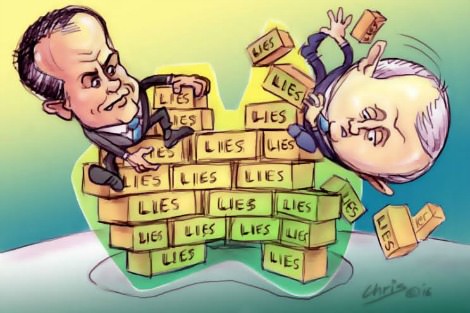
AUSTRALIA
- Justin Glyn
- 11 April 2016
10 Comments
We got a lesson in the art of language from the Minister of Immigration, Peter Dutton, whose redefinition of the word 'detention' was reminiscent of Humpty Dumpty's remark in Alice Through the Looking Glass: 'When I use a word it means just what I choose it to mean, neither more nor less.' We are social creatures who make real decisions based on the representations of others. Once we know we cannot expect the truth from each other, especially those who govern, society can no longer function.
READ MORE 
-

INTERNATIONAL
- Catherine Marshall
- 04 April 2016
2 Comments
When suicide bombers struck Brussels, I was travelling far from home, in southern Italy. The news evoked in me a sense of vulnerability, for within days I would board a series of flights from Reggio Calabria to Rome to Abu Dhabi and then Sydney. For a moment, it seemed the terrorists had achieved what they set out to do: spread fear and distrust far beyond the site of their attacks, across countries and continents and oceans so that eventually the whole world would be infected.
READ MORE 
-
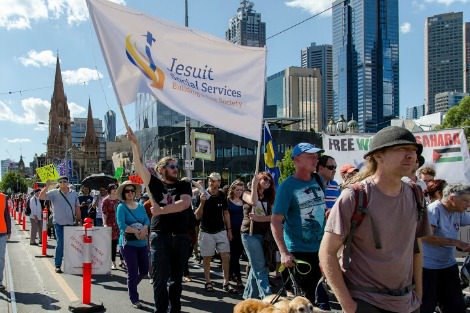
AUSTRALIA
- Moira Rayner
- 22 March 2016
18 Comments
When I received my invitation to 'lead' the Palm Sunday Walk for Refugees my first response was to ignore it. This was partly ego and partly disillusionment. It's true that in Melbourne at least 6000 people walked or struggled or strode along Spencer Street. But I no longer believe marches for huge national issues have any effect on local powerbrokers. I believe as Saul Alinsky said that the most powerful force for change is local activism on local issues and generational organisation from the grass roots up.
READ MORE 
-
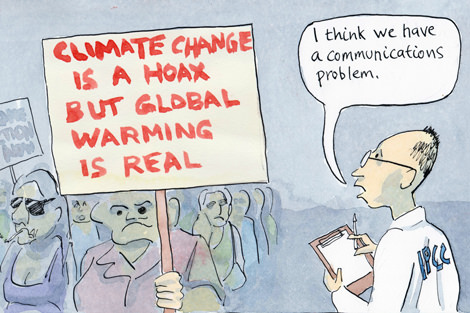
ENVIRONMENT
- Greg Foyster
- 11 March 2016
3 Comments
The best known examples of framing come from American cognitive linguist George Lakoff. He argues that George W. Bush replaced the phrase 'tax cuts' with 'tax relief' to reframe paying tax as an affliction. Embedded in those two words is a neo-conservative worldview against government intervention in the private sphere. If you accept the term, you absorb the worldview. In a similar way, a few words could build political will to tackle climate change. The problem is no one is sure what they are.
READ MORE 
-

ARTS AND CULTURE
- Tim Kroenert
- 10 March 2016
6 Comments
When questioned about diversity in his films recently, Joel Coen replied: 'You don't sit down and say, "I'm going to write a story that involves four black people, three Jews, and a dog".' The answer is disingenuous at best. Filmmakers choose what stories to tell and how; with a few exceptions, the Coens tell stories about white men. Just as Quentin Tarantino ought to continue discussing the role violence and misogyny play in his films, the Coens should engage meaningfully with questions of diversity.
READ MORE 
-
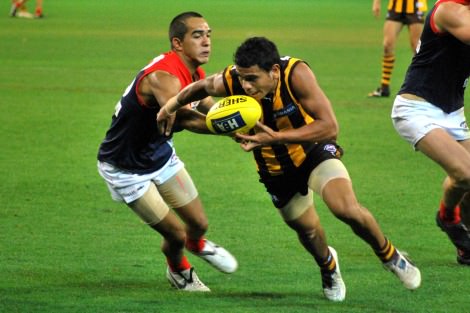
MEDIA
- Erin Riley
- 29 February 2016
16 Comments
Sports journalists shape narratives. There is drama intrinsic to sport, but the sports journalist draws it out, identifying heroes and villains, and slotting each performance into a broader arc. The power to influence the way the public understands a game or player ought to be wielded carefully. Too often, it is not. This is best demonstrated by the ways in which commentators and journalists speak about Indigenous athletes. A simple superlative can be loaded with more than a century of cultural baggage.
READ MORE 
-
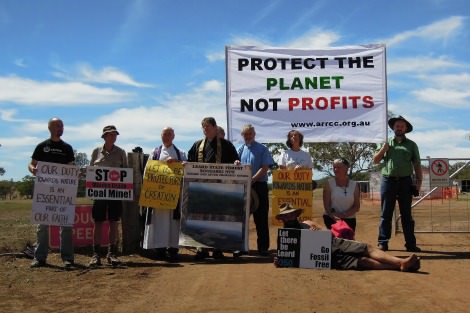
AUSTRALIA
- Fatima Measham
- 18 February 2016
5 Comments
The formative experiences of Australian early boomers include unprecedented access to university education and health care, immersion in feminist discourse, Aboriginal land rights campaigns, environmental activism, LGBT movements and pacifism. Quite remarkably, it mirrors some of the elements that engage millennials. While in some ways anti-boomer sentiment seems well placed, what it misses is that on social issues a 21-year-old might have more in common with a 61-year-old than a 71-year-old.
READ MORE 
-
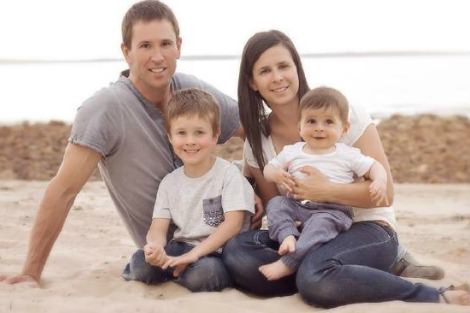
AUSTRALIA
- Lyn Bender
- 18 January 2016
18 Comments
In the early hours of a brand new year, two small boys had their lives extinguished by a purportedly depressed father. For me this event brought to mind two cases from a past life, when I was the manager of Melbourne Lifeline. One was a woman who disclosed that she had killed her two small children a decade earlier. In a second case, a belligerent suicidal man expressed rage towards his former partner, who was about to remarry. I asked pertinent questions. Would he harm his children? 'Yes.'
READ MORE 
-

RELIGION
- Michael McVeigh
- 07 December 2015
45 Comments
At the moment, the conversation on marriage equality vs traditional marriage is being driven by extremists on both sides, people who see the struggle as a polarised conflict with the goal of overwhelming victory. But most of us would find that victory unattractive no matter which side is triumphant. Instead, we can choose not to press the button, and to work together to allow both same-sex couples and practising Christians to live their beliefs faithfully, to the fullest of their flourishing.
READ MORE 
-

RELIGION
- Frank Brennan
- 03 December 2015
The consideration of medico-legal problems in the public square of a pluralistic democratic society keeping pace with profound technological change is often marked by simplistic assertions, precluding considerations of comprehensive world views, whether religious or philosophical. It is now commonplace for doctors to be told to leave their consciences at the door, as their patients are consumers and they are suppliers and of course the market decides. Debates about law and policy are often resolved with simplistic assertions about individual rights and autonomy, with little consideration for the public interest, the common good, and the doctor-patient relationship. Even conscience is said to be a matter for contracting out. This evening I ask whether there are more compelling ways to resolve medico-legal dilemmas, while conceding a limited role for law in determining the range of acceptable answers.
READ MORE